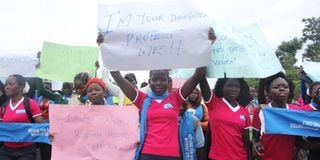Activists want special rapporteur for SGBV cases

What you need to know:
- Civil society organisations dealing with SGBV to ensure seamless flow in the attainment of justice for victims.
- They want a Constitutional petition seeking reparations for victims by eight survivors of the 2007-08 poll chaos filed in February 2013 concluded.
- Want government to apologise to victims, most of who are from Kibera, Kericho and Naivasha.
- Police have also been accused of failing to document the offences.
- Want Judiciary to create special courts to deal with SGBV cases.
- Appeal to the Executive to ensure SGBV response services, including justice services are designated as essential and remain accessible at all times.
Civil society organisations dealing with sexual and gender-based violence (SGBV) cases want the government to create an office of special rapporteur to ensure seamless flow in the attainment of justice.
The stakeholders said various commissions of inquiry on SGBV like the Waki Commission, had recommended the formation of the office to enhance speedy and successful handling of cases.
In a virtual forum organised by Kenyan Section of the International Commission of Jurists, the stakeholders also want President Uhuru Kenyatta to push for investigation and prosecution of politically instigated SGBV cases.
ICJ-Kenya chairman Kelvin Mogeni raised concern over delay in prosecuting SGBV cases committed during the 2007-08 post-election violence.
The civil society specifically wants a Constitutional petition seeking reparations for victims by eight survivors of the 2007-08 poll chaos filed in February 2013 concluded, saying it could chart the way forward on how to deal with such incidents during polls.
The petitioners allege that the perpetrators marked women and girls for rape, defilement and other indecent acts. At times, they were perpetrated by gangs with an aim to transmit STDs such as HIV/Aids.
Men too, were sodomised, subjected to forced circumcision and genital amputations.
PROTECT PUBLIC
The petitioners want the government to apologise to the victims, most of who are from Kibera, Kericho and Naivasha, saying police were ill-trained to protect members of the public from sexual violence.
Police have also been accused of failing to document the offences, while some public hospitals allegedly failed to offer emergency services to the victims, thus many contracted life threatening STDs and unplanned pregnancies.
The petition is supported by ICJ Kenya, the Coalition on Violence against Women (Covaw), the Independent Medico-Legal Unit (IMLU) and Physicians for Human Rights (PHR).
Kenya Demographic and Health Survey data showed that an estimated 45 per cent of women and girls are facing some form of gender-based violence annually, with a sharp rise during Covid-19 pandemic.
During the deliberations, the panelists emphasised that SGBV had long-term effects on victims including life-long emotional distress, mental health challenges and poor reproductive health.
Mr Mogeni said various actors had demanded that those involved in the criminal justice system prioritise such matters, especially now that they were on the rise.
For instance, civil society wants the Judiciary to create special courts to deal with SGBV cases where the judicial officers in those courts are specially trained to effectively deal with the cases.
DEVOLVE SGBV DIVISION
They also want courts to fast-track SGBV cases pending in court despite the Covid-19 pandemic, and ensure the safety of victims and their right to fully participate in the court proceedings.
Mr Mogeni also wants the Office of the Director of Public Prosecutions (ODPP) to end the use of alternative justice systems to resolve SGBV cases, noting that the victims, mainly women and children, suffer.
“The ODPP should decentralise and devolve the SGBV division to the lowest administration level possible across the country. It should coordinate with the investigative actors to ensure that all evidence is collected and preserved for presentation to court,” he said.
Mr Mogeni appealed to the Executive to ensure SGBV response services, including justice services are designated as essential and remain open and accessible at all times.
He also wants the government to guarantee individuals that they can safely and confidentially report, break free of abusive situations by providing accessible support, advice and reporting mechanisms.
To support this, they want provision of shelters, toll free lines and one-stop assistance centres where victims can access investigators and healthcare experts without hindrances.
“SGBV is rooted in a failure of the State to uphold the rights to equality and non-discrimination of women and girls, and is rooted in the societal beliefs on gender and gender roles. At the core of addressing SGBV, is a change of attitude and breaking of negative perceptions and judgments against victims,” says the ICJ boss.




